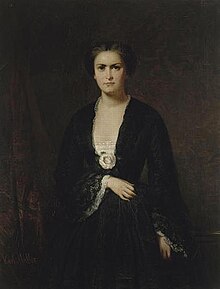Sophie Cruvelli
Later in 1847 she was singing Odabella in Rovigo, and it was there, at the end of that year, that Benjamin Lumley heard and ('struck with the splendid voice, the impulsive dramatic temperament, the spirit, and the captivating person') recruited her for the season of 1848 at Her Majesty's Theatre in London, of which he was the impresario.
The family objected that she was too young to face the English public, but Lumley was urged to proceed by the tenor Rubini: 'I tell you plainly, and with deep conviction, that you are making an excellent acquisition.
A brief illness delayed her performance of Lucrezia Borgia, but the cast of Gardoni (Gennaro), Luigi Lablache (Alfonso) and the debutante Mlle Schwarz (Orsini) made it worth waiting for.
[14] H. F. Chorley at this time said she had 'youth – a presence commanding, if somewhat peculiar – a superb voice, almost three octaves in compass – and a fervour and ambition which it could not then be foreseen would take their after-forms of reckless and perverse eccentricity.
Cruvelli had a short spell in Bellini's Norma at the Royal Opera House in Berlin, and then sang from November 1848 until March 1849 at the Teatro Grande in Trieste, mainly in Verdi's Attila, Ernani and Macbeth, and in Don Pasquale.
[17] In the same year she appeared at the Teatro Carlo Felice in Genoa in Verdi's new opera Luisa Miller, and repeated her Ernani, Nabucco, Attila, and Norma.
For this production, musical recitatives were composed by Michael Balfe imitating Beethoven's style, pointing the content of the dialogue with motifs drawn from the principal arias.
[22] Most appreciated them, but James William Davison, critic of The Times, was angered because he claimed that Cruvelli had altered the music 'in such a way as to bring it within range of mediocre capabilities.
But Cruvelli's successes continued there with Le nozze di Figaro with Sontag, Fiorentini, Coletti, Ferranti and Lablache, and in Ernani with Sims Reeves.
'[27] The Her Majesty's concerts took place, including a notable performance of the trio 'Don't tickle me I pray' with each part triplicated, with sopranos Cruvelli, Sontag and Jenny Duprez, tenors Reeves, Calzolari and Gardoni, bassi Lablache and others.
[29] Late in 1851 Cruvelli went to the Théâtre-Italien for the winter, and the following spring returned to London to sing with Gardoni and Lablache, appearing in La Sonnambula and Il barbiere di Siviglia, Ernani and Fidelio.
[30] Lumley had achieved the remarkable coup of booking the soprano Johanna Jachmann-Wagner to sing at Her Majesty's in May 1852, but she (or her father and agent Albert, Richard Wagner's brother) were bribed by a better offer from the Covent Garden management and broke their contract.
In the midst of this crisis Sophie Cruvelli, the surviving mainstay of the company, suddenly disappeared from London, on the day she was to have sung Lucrezia Borgia.
Yet when Verdi wanted to cast Cruvelli as Violetta for the première of La traviata, which was presented with a different singer in Venice in March 1853, he was unable to do so because she was still under contract to Lumley.
[33] During 1853, Sophie Cruvelli made appearances at the Théatre-Italien and became a favourite of Emperor Napoléon III, despite, or perhaps assisted by, her reputation for mischievous ill-temper and unreasonableness.
The role was instead offered to Palmyre Wertheimber, a new singer from the Opéra-Comique who had made her debut at the Opéra as Fidès in Le prophète and was much admired and praised by Théophile Gautier.
[35] Cruvelli, meanwhile, returned to London for engagements at Covent Garden, where she sang Desdemona in Rossini's Otello (with Antonio Tamburini and Giorgio Ronconi), Leonore (in Fidelio) and Donna Anna (Don Giovanni).
A crisis was precipitated when, just before the performance of Les Huguenots scheduled for 9 October, Cruvelli drew her fees and disappeared (her second "Flight"), taking with her some compromising letters from M. Fould.
The absence of Cruvelli prompted Verdi to threaten to cancel the première of the Sicilian Vespers,[38] and on 6 November Roqueplan, who had run up a deficit of 900,000 francs, was asked to resign, and his adversary Louis Crosnier (former director of the Opéra-Comique) replaced him on the 11th.
Not only was the librettist, Scribe, unresponsive to his pleas for revisions, until finally, with no premiere in sight and the mysterious disappearance from rehearsals of Sophie Cruvelli who was to sing Hélène, he was forced to write to the Opera's director, Louis Crosnier: "To avoid the catastrophe that menaces us ...
Cruvelli reappeared as miraculously as she had gone, and on 13 November she sang Les Huguenots: at first there was some hissing, but she rapidly won over the audience by the power of her performance, and triumphed magnificently with receipts climbing to more than 9,000 francs for her first few appearances.
Performances continued through the year: Charles Santley, en route to Italy to commence his own studies with Lamperti or Nava, delayed in Paris for a day to hear Cruvelli in the Sicilian Vespers on 31 October 1855.
However she did make further appearances after 1858, mainly in splendid Benefit concerts at her winter residence, the Villa Vigier in Nice, where for many years she drew together the international high-society of the Second Empire in her Salon, the 'Cercle de la Méditerranée'.
[51] After a visit to the Opera House in Monaco (then newly set up under Raoul Gunsbourg), Sophie Cruvelli died aged 81 on 6 November 1907 in the Hotel de Paris in Monte Carlo.


